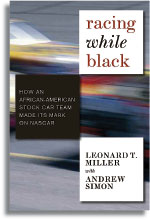Racing while BLACK – A conversation with LEONARD T. MILLER
March 6, 2010 by Las Vegas Black Image Magazine
Filed under Conversation, Feature
At its “Paint the Town Red” charity event this month, Bellagio will auction off the book “Racing While Black,” by author Leonard T. Miller. The 1983 Morehouse College graduate recently spoke to Black Image about his experiences in NASCAR, shedding further light on some of the trials chronicled in the memoir.
What is your book about?
The book covers my father and me through the course of … building NASCAR racing teams at a grass-roots level from 1993 to 2007. It tells the story of our efforts to push African-American drivers in the sport of NASCAR. It highlights our trials and tribulations, and also accomplishments during that span of time.
What were some of those challenges?
The book, “Racing While Black,” illustrates all of the efforts to secure the proper financing to participate in the car racing industry. One of the main purposes of the book is to show that African-Americans do drive race cars and we are interested in competing in the sport. There have been, in the last 15 years, hundreds of articles that state that African-Americans don’t start driving race cars at an early age. That black-owned companies don’t sponsor their own African-American teams. Also, many articles indicate that we are not interested in the sport of car racing, and my book addresses some of these misperceptions.
How did your father participate in the sport of auto racing?
He put together an all-black racing team in the 1970s that was sponsored by a tobacco company with a multimillion dollar contribution. They raced against some of the best teams from around the world. He was the first African-American to enter a car into the Indianapolis 500 in 1972.
When did you realize that you were racing while black?
It came into play for me in the early 1990s. We started approaching over 60 Fortune 500 corporations from the early 1990s to 2007. It seemed that we ran into the same roadblocks over the decades. We were referred to companies’ diversity departments — and in my opinion, they are basically ceremonial departments set up to appease the African-American community with an idea that the corporation is a good citizen to the black community. They set up photo ops and superficial programs to look good in the press with black people, but they don’t put much money behind black race teams. It is actually one-dimensional, and if you go to a company with your auto racing proposal, it immediately falls on deaf ears when they see that you are African-American. For example, if there is a million dollars and they donate it to the NAACP, or for a statue of Dr. Martin Luther King Jr., that budget is already wiped out for any other African-American effort for the year.
What are corporations not understanding as it relates to sponsoring an African-American in auto racing?
They don’t seem to understand that the African-American market is an added value, bringing additional revenue to their bottom line. Nonetheless, with our sponsorship proposals, we present an entire package that includes marketing the sponsor’s products to the masses. We don’t come in and say that we are just marketing to the African-American market. In auto racing the corporate sponsors will quickly tell you that there are no African-Americans in the grandstand as ticket holders. “So, why should we sponsor an African-American race team or driver?” They don’t understand how as an African-American race car team (inside) an all-Caucasian industry, you stand out like a sore thumb. It attracts a lot of eyes and ears to your associated brand. When you see Serena Williams playing tennis, you don’t see a lot of African-Americans in the stands. Also, when Tiger Woods is playing in a major tournament, there are not a lot of African-Americans on the sidelines. A vice president of a major beer brewing company once told me, “You people dance, sing and play basketball. That is where we are going to put our sponsorship dollars. We don’t need a black race team.”

How many African-Americans are presently racing in NASCAR?
Right now there is one, Mark Davis, who is 20 years old and he is tapped out of money. His dad recently died and before he died he used up his 401K and took out a mortgage on his home. They raced on a limited basis last year, doing only five races at $200,000 apiece. They are now out of money. Mark has the potential to go to the top and win many races and even the championships. But they have been unsuccessful, like my father and I, in securing corporate sponsors. It falls on deaf ears.
How do you reconcile this and break this glass ceiling?
We have to bring in a white partner. We don’t see any future in NASCAR. We have to go back to the Indianapolis 500 — where the people who financially support it are more worldly, sophisticated and of a higher education. With our white partner, going to meet with corporations on behalf of our black race car drivers and teams, we might make more headway.






